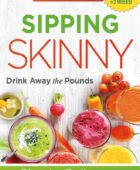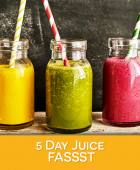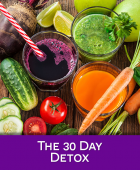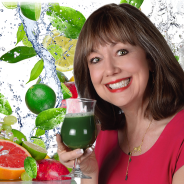Juicing for Thyroid and Hashimoto’s
Could poor thyroid function be making you sick, tired, or overweight? Your thyroid is a key gland that’s tied to every other system in your body. When it’s out of balance, you’re out of balance. It could be the reason you have trouble losing weight or keeping the weight off.
A blood test may never indicate that you have a problem with this gland. Thyroid tests are designed to identify hypothyroid, not a sub-optimal—just-a-bit-below-par thyroid function. If you have a number of symptoms of low thyroid, chances are that you could benefit by working on your thyroid health by making lifestyle changes.
Symptoms of Low Thyroid Function
- Absent mindedness
- Feeling of deep gloom for no apparent reason
- Irritability for no apparent reason
- Chronic fatigue and weakness
- Weight gain or difficulty losing weight
- Hair loss or coarse, dry hair
- Dry, rough skin
- Intolerance to cold
- Abnormal menstrual cycles
- Decreased sex drive
- Inability to remember things
- Constipation
- Depression
- Muscle aches and cramps
- Fluid retention or puffiness
It’s important to remember that using prescription thyroid hormone replacement is at times necessary, but it should only be used as a Band-Aid while the actual cause of hypothyroid is explored. It’s not advantageous to stay on thyroid medication indefinitely even though these hormones may reduce symptoms. It doesn’t heal your thyroid gland. In fact, it has the opposite effect—your body will slowly produce less and less thyroid hormones because there are enough hormones in your system. Like your muscles, your thyroid will get weaker and weaker from lack of use.
Thyroid Problems: Causes and Contributing Factors
There are many causes of hyper- and hypothyroidism that are never addressed or treated when diagnosed; things like imbalances in stress hormones or sex hormones, environmental toxins, food allergies, nutritional deficiencies, inflammation, and infections—all of which may be a source of the problem. Also, poor diet can harm the thyroid’s ability to make T4 thyroid hormone, as well as the cell’s ability to convert T4 into the active form, T3.
Psychological factors
Not only are we affected by stress we’re affected by our responses to the stressors. Actually, our responses are more important because they determine the degree to which our body is impacted by the stress. Personality issues are also important, such as being high-strung, extremely ambitious, aggressive, or angry, which creates more stress.
Dietary factors
People who over-consume sea vegetables, iodized salt, stimulants such as caffeine and soda pop, or take too much tyrosine may experience hyperthyroidism. On the other hand, excessive consumption of soy, peanuts, millet, and raw cruciferous vegetables (arugula, broccoli, Brussels sprouts, cabbage, collard greens, cauliflower, kale, mustard greens, bok choy, radish, horseradish, kohlrabi, turnip, rutabaga and rapini.) and the mint family (basil, bugleweed, catnip, lavender, lemon balm, marjoram, motherwort, oregano, peppermint, rosemary, spearmint, thyme) can suppress the thyroid gland because they block iodine absorption. This can contribute to hypothyroidism. All these vegetables and herbs are very healthy and should not be eliminated from your diet, but rotated with other vegetables. The cruciferous vegetables should be eaten in smaller amounts. The herbs are not of concern because they’re usually eaten in small amounts. Cooking can help to deactivate some of the goitrogenic compounds in the vegetables and herbs. Also, soy products (edamame, tofu, tempeh, soy sauce, miso, soy cheese, soymilk, textured vegetable protein) and peanuts are in the same goitrogenic category and block iodine absorption. Additionally, deficiencies of iodine, zinc and vitamins A, B2, B3, B6 and E can contribute to hypothyroidism.
Toxins
The thyroid is a sentinel organ, and is usually one of the first that is impacted by toxicity. According to the Functional Endocrinology Center of Colorado, chemicals such pthalates, flame retardants, bisphenol A, dioxins, perfluorinated chemicals (PFOA), fluoride, perchlorate, thiocyanate, and pesticides, are very disruptive for its function. Phthalates are widely used to make plastics flexible. They can be found in shower curtains, medical tubing, plastic toys, and personal care items such as fragrances, nail polish and lotions. They’re also showing up in drinking water. Phthalates impact thyroid regulation by decreasing thyroid hormone receptor activity. Municipal water treatments do not effectively remove them from the drinking water. Polybrominated diphenyl ether (PBDE) is a flame retardant chemical used in furniture foam, carpets, upholstery, clothing, toys, draperies, and electronics. This chemical readily accumulates in fat cells, and has been linked to a decrease in TSH levels. Bisphenol A (BPA) is a plastic chemical commonly used in polycarbonate water bottles, baby bottles, plastic toys, medical tubing, food packaging, and dental sealants. It has also been linked to disruption in thyroid receptors and thyroid function. Dioxin is a group of chemicals that includes polychlorinated biphenyls (PCBs), polychlorinated dibenzo dioxins (PCDDs), and polychlorinated dibenzo furans (PCDFs). These are byproducts from industrial processes like chlorine paper bleaching, pesticide manufacturing, and smelting. Dioxin was also a part of the toxic Agent Orange used during the Vietnam War. These chemicals interfere with production, transportation, and metabolism of thyroid hormones. PFOA (perfluorinated chemicals) and PFOS (perfluorooctane sulfonate) used in nonstick cookware, stain-resistant materials and food packaging have been linked to decreased thyroid hormone levels. Perchlorate is a byproduct of rocket fuel production that has shown up in drinking water, certain fruits and vegetables, and dairy products from cows that eat contaminated grass. It can inhibit iodine absorption, leading to low thyroid function. Thiocyanate is a chemical found in cigarettes and certain foods, which may inhibit iodine uptake.
One of the best things you can do to avoid all this toxicity is to purchase only organic produce because pesticides sprayed on non-organic foods often contain estrogenic compounds, which can affect the endocrine (hormonal) system that includes the thyroid. Avoid all plastic water bottles. Purchase a high-quality water purification system. Use an air filter in your home. Cook with only natural product cookware. Choose organic mattresses, bedding, towels, carpets, and fabrics for your home. Clean with eco-friendly, natural products. And choose only fragrance free, chemical free, and organic personal care products.
Halogens: Chlorine, Fluoride, and Bromine
Halogens are now becoming ubiquitous in our environment and have major consequences for thyroid function. Iodine is known as a halogen (electronegative element) and shares chemical properties with other halogens like chlorine, fluorine, and bromine. Because of their similarity, these other halogens can displace iodine and disrupt thyroid function. Chlorine is added to our municipal water supply. Fluoride is also added to our water as well as toothpastes, and used in dental treatments. Many popular sports and electrolyte drinks contain brominated vegetable oil. Bromine also is used in some baked goods and fire-retardant compounds. Bromine-based fire retardants used in carpets, mattresses, upholstery, furniture, and various electronic equipment have become suspect for causing or contributing to hypothyroidism.
Foods That Heal the Thyroid
Some foods boost thyroid function, which makes them perfect for hypothyroid, under-active, or low thyroid function, while others suppress thyroid function, which can help people with hyper- or overactive thyroid but should be avoided or reduced by those with under-active thyroid. And there are certain foods that are best for everyone to avoid for the sake of a healthy thyroid gland and overall health.
Best Foods for the Thyroid Gland
The following foods are among the most helpful for restoring thyroid balance:
- Raw foods—eat more raw foods
- Fresh raw vegetable juices
- Low-sugar fruit especially lemons, limes, cranberries and other berries, and green apples
- Raw nuts and seeds, especially almonds
- Seaweed for their rich iodine content
- Fish
- Beans
- Coconut oil
- Chlorophyll-rich green juices such as watercress, collards, chard, kale, kohlrabi leaves, beet greens, and parsley. (Vary the cruciferous greens with other non-cruciferous greens such as lettuce, beet greens, watercress (cruciferous, but good for the thyroid), and spinach. Watercress has been shown to especially help the thyroid.
- Turkey
Juices that Help the Thyroid
They are good sources of iron, B vitamins (needed for hormone creation), Vitamins C and D, beta-carotene, chlorophyll, and magnesium.
- Watercress
- Spinach
- Kale
- Collard greens
- Turnip greens
- Beet greens
Excerpts from The Juice Lady’s Remedies for Thyroid Disorders
Watercress Lemonade Thyroid Booster
Watercress is exceptionally beneficial for the thyroid.
2 apples, green is lower in sugar
1/2 lemon, peeled if not organic
1 handful of watercress
Juice all ingredient, stir and enjoy!
Serves 1
From The Juice Lady’s Remedies for Thyroid Disorders










Our grown son has been diagnosed with hyperthyroidism. please send information specifically for this situation.
Yes, he is under doctor’s care and is taking medication –
thank you
George,
I have a lot of information in my book The Juice Lady’s Remedies for Thyroid Disorders. It would be good to get the book.
Hi Cherie,
Loved this thorough article on the thyroid. Been on meds for years for hypo and endocrinologist recently lowered dose as she said I was being “overtreated”. Struggling with weight gain, mood etc now. Buying some watercress today to add to my cold pressed veggie juice I make!
I wrote you a testimonal recently regarding the Bone Broth Protein Powder and I have another lovely side effect. Two years ago I had a total hip replacement. The hip has been great but I’ve been having what they call “stem end pain” where the shank of the prosthesis goes into the femur bone. I would wear a compression band to help. Well, since I started the bone broth, I have no more pain! Ortho surgeon said it takes time for the bone to graft to prosthesis and I think the broth just expediated the process. Thank you so much! Feel free to share.
Dear Wendy, I am so happy to hear of the good results from the bone broth. I would love to share this. I didn’t get the first part of your testimony. Would you mind resending it? Happy New Year and blessings to you. Cherie